#What I imagine he would be like in vol 9 if vol 6 didn't happen & he were still affiliated with Cinder up to vol 8 but falls into ever
Text
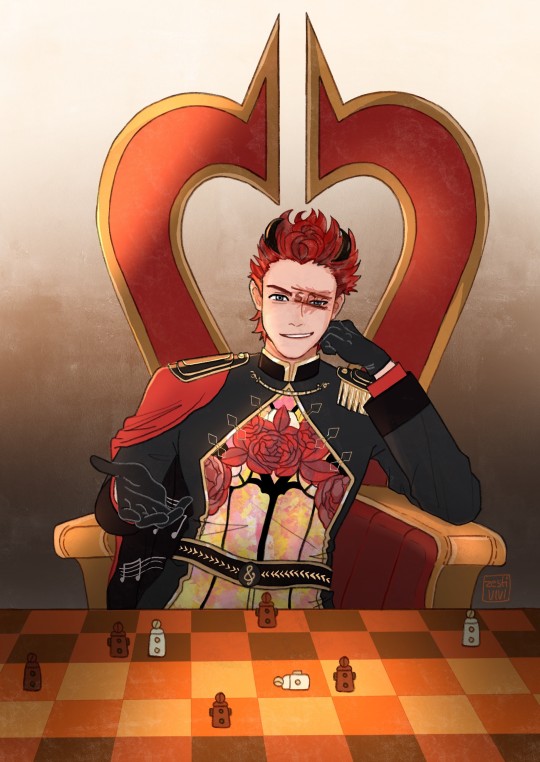
My Ever After comm of Adam from @zestivivi
#adam taurus#rwby#art#<3#I was playing games and really wanted to see Adam wear this once I saw this outfit xD#What I imagine he would be like in vol 9 if vol 6 didn't happen & he were still affiliated with Cinder up to vol 8 but falls into ever#after while fighting with rwby. Wakes up with his mask gone and makes his way throughout the world. End up meeting rwby again. Round 2#(*coughs* 3 for others) begins ^_~#...Is it just me or do those little chess pieces resemble the daleks from doctor who? OAO#Well he's made his move. What's your next move >:3c?
79 notes
·
View notes
Text
My Thoughts on Kanou and Someya's Relationship
Note: I'm not referring to Kanou Somoku and Someya Kaoruko. I'm referring to their parents. I'll address Kanou as Somoku, his father as Kanou, and Kaoruko's father as Someya. This is not a review of Okane Ga Nai. I will not be criticizing nor defending the series and all of its problems. This is just an account of my thoughts on Kanou and Someya's relationship.
The first time I read Okane Ga Nai, I never thought I'd be consumed with the desire to create fanfiction/fanart of a side pairing, much less this massive, soul-consuming post, yet here I am. I'll go by sequential order, oldest chapter to the newest.
1.) Vol. 6, Ch. 4
In this chapter, Ayase asked Somoku if he and his father had any nostalgic memories. Somoku answers no because Kanou took him to mahjong clubs.
Nothing much happened here in terms of Kanou and Someya's relationship. However, I include this flashback because it's the first time we see these characters interact, and it gives us an understanding of their dynamic.
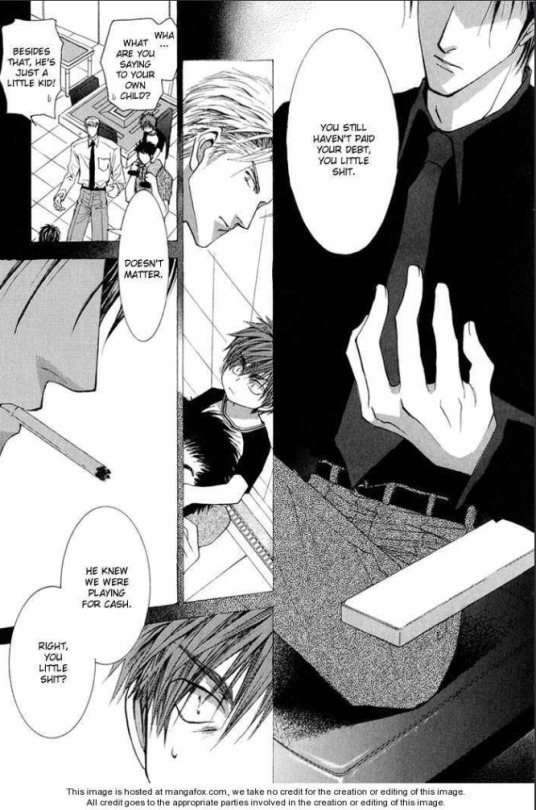
As we saw in this picture, Kanou and Someya's dynamic is lacking. Someya objects to Kanou's cruel demand to be paid for beating Somoku, and Kanou dismisses him.
There is no chemistry between them. Their interactions are reserved and distant. I really don't have much to say about this flashback other than this wasn't the moment I decided to ship them. The following section is when I started to get interested.
2.) Vol. 8, Ch. 4.5
This comic strip is to blame for my obsession. Basically, it's just a funny story about Somoku's upbringing.
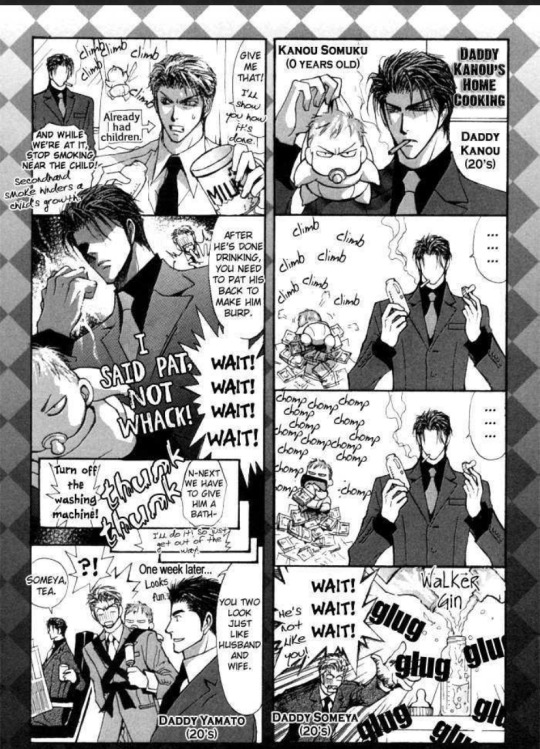

I like how Somoku was basically a demon since birth lmao.
Anyways, the reason why I say this comic strip was the cause of my obsession is that Kanou had to rely on Someya. A ruthless man is reduced to an incompetent father who has to rely on his friend with the personality of a chihuahua. How funny is that?? I found it hilarious and cute.
But the other reason why I love this comic strip is that Kanou is getting used to Someya. Thinking back to Vol. 6, Ch. 4, I mentioned that Kanou basically treated Someya like an outsider. To me, that implies that Kanou wanted to raise Somoku alone; he didn't want/need the opinion of others. And with Kanou's mindset that not even familial bonds should get in the way of business, it's no surprise that Kanou would raise Somoku alone. However, he realizes that raising a kid isn't as easy as he thought it would be lol.
So here comes Someya in all his short-tempered glory and destroys Kanou's peace. I imagine that Kanou would be uncomfortable with having another person barging into his home, nagging him for his inappropriate behavior, and making noise when playing with his baby. And that uncomfortable feeling is manifested in silence as Kanou just listens to Someya scold him like in the second picture. I mean, what else can Kanou do to not piss off the only help he has? He's helpless, and I love it LMAO
I was fangirling so hard after reading this comic. And then comes Vol. 9, Ch. 38
3.) Vol. 9, 38
There isn't much interaction between Kanou and Someya, but there are cute moments about Someya being important to Somoku.

First, let me start off by commenting on this picture.
AHHHH! The cuteness overload >.< Anyways...
I'm probably reading too much into this picture, but I can't help but feel like this is symbolic. Turning your back to someone is a symbol of trust, and the fact that Kanou is back-to-back with Someya is making me squeal!!! But not only does Kanou trust Someya, but Somoku trusts Someya. So much so that he prefers sitting in Someya's lap over his father's lap. It might be logical that Somoku would prefer to sit with Someya, but Somoku grew up with his father's lessons about trusting no one; Somoku wouldn't trust so easily with that mentality but he doessssss! He finds security and maybe even comfort in Someya, and that's just so cute to me.
Someya is the glue of the Kanou household, the center, and I'm dying to see more about the trio.
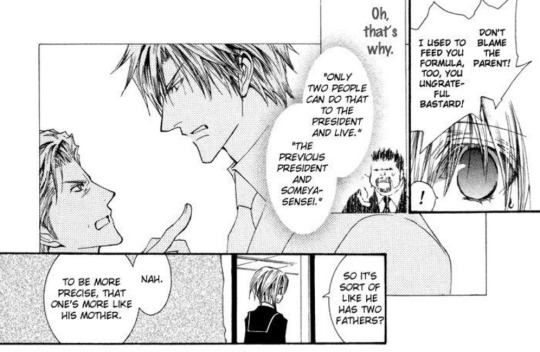
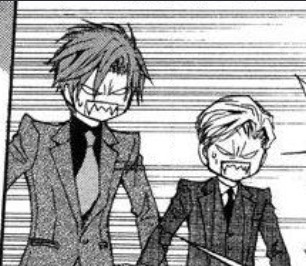
Last comment about this chapter, take a look at the quote, "'Only two people can do that to the President and live. The previous president and Someya-sensei." The side character says this to Ayase after he sees Someya whack Somoku and it's just so funny to me. Like, the poor boy was just thinking about how scary Somoku was that he had yakuza henchmen trembling and then out comes some angry chihuahua to hit Somoku. Everybody gangsta until your parents whoop your ass.
Also, look at how alike Someya and Somoku are <3
Last thing I swear. Takanohashi is a real one for starting my "Someya is a mother/wife" campaign lmao he's a fudanshi at heart.
4.) Vol. 10, 45.1
THIS IS MY FAVORITE FLASHBACK!

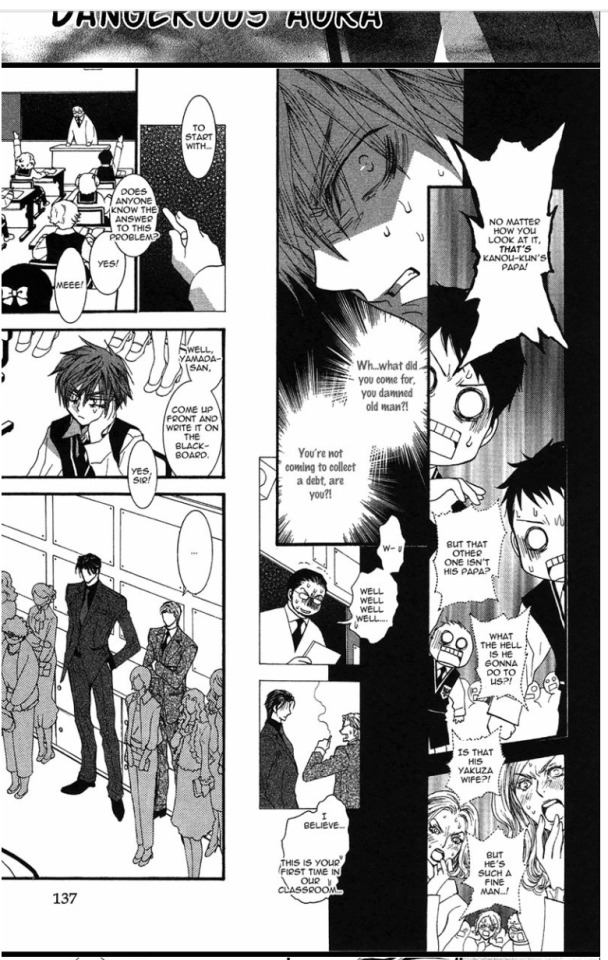

Okay, so this is my favorite flashback because KANOU IS FINALLY COMFORTABLE WITH SOMEYA!
Kanou feels comfortable enough to tease Someya by calling him a "certain fussy lawyer." The tone of the panel where the quote comes from is a joking tone because the characters are drawn in a style similar to chibi form, which is why I say it's a joke and not an insult. They've become so close as they rightfully should be because they've been raising a kid together for years.
Another reason I love this flashback is that Somoku secretly loves that Someya showed up for him. He was prepared to not see his father at the school and then comes Someya and Somoku blushes! It warms my heart that a child gets the emotional support they deserve.
I have to say that as much progress as Kanou and Someya have made, Kanou still thinks he's alone sometimes. Someya yells in the last picture, "...when you say 'I'm taking responsibility for Somoku!'" Kanou still makes comments where he takes sole responsibility for Somoku, and that hits hard after looking at the latest chapters, but basically, it's like Kanou reminds himself that he shouldn't confide in Someya as a co-parent. And that's just sad :(
5.) Vol. 12, Ch. 5
This is so cuteeee <3
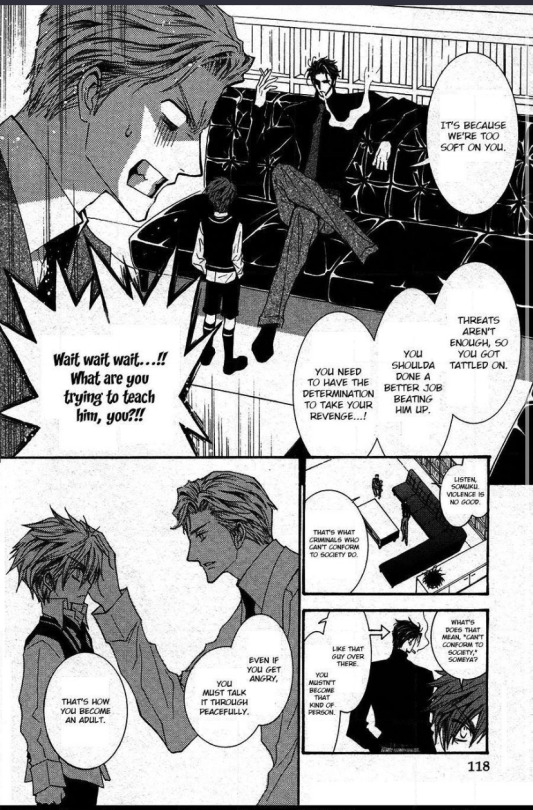

"It's because we're too soft on you." -> AHHHHH! <3<3 Another example of Kanou being comfortable with Someya. He's thinking about themselves as married.
"I'll sue him for defaming your father's character!!" -> Actual development on Someya's part. Usually, Someya gets mad at Kanou, but this time he's mad for Kanou. This time Kanou isn't the enemy in Someya's eyes; Kanou is the one who needs "protecting."
Also, can I point out that Someya spends way too much time with the Kanous? I understood that he needed to be there a lot because Somoku was a baby, but now he's a child, he should be able to live another day under Kanou's "care." Someya doesn't need to be there, but I love that he is there often :)
6.) 69-71
HERE COMES THE ANGST. I don't know if this counts as a spoiler because the chapter(s) has been on mangago.com for a good month, but whatever, spoiler alert.
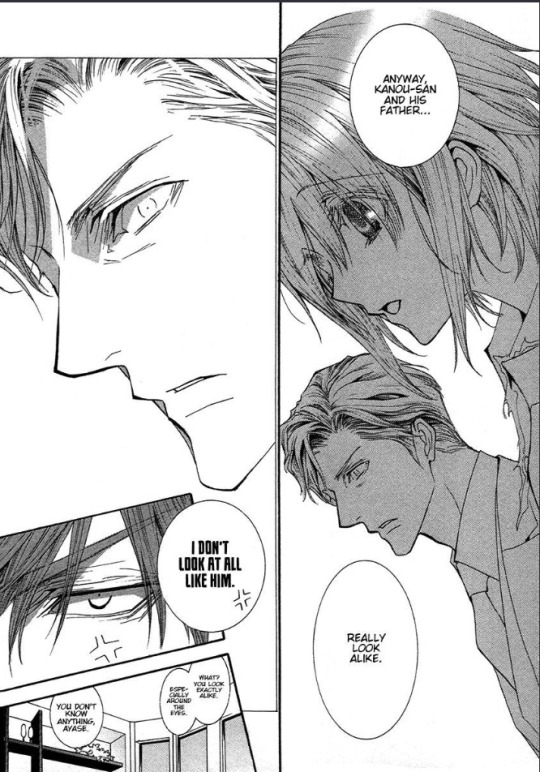
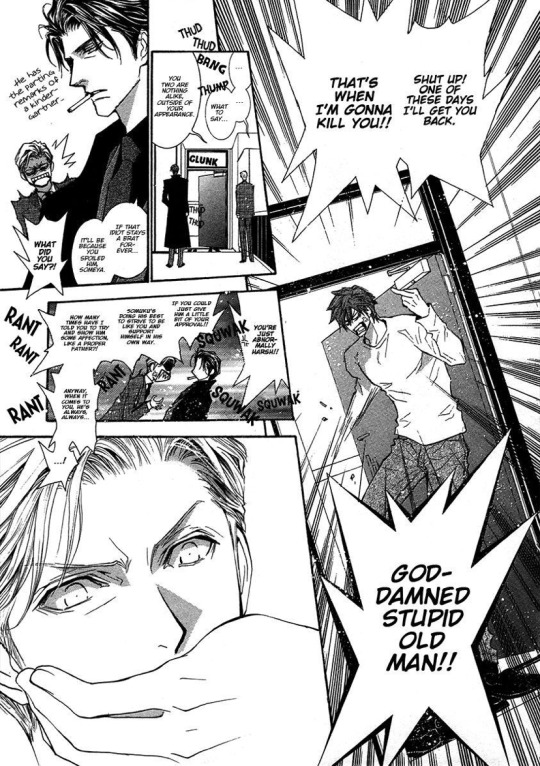
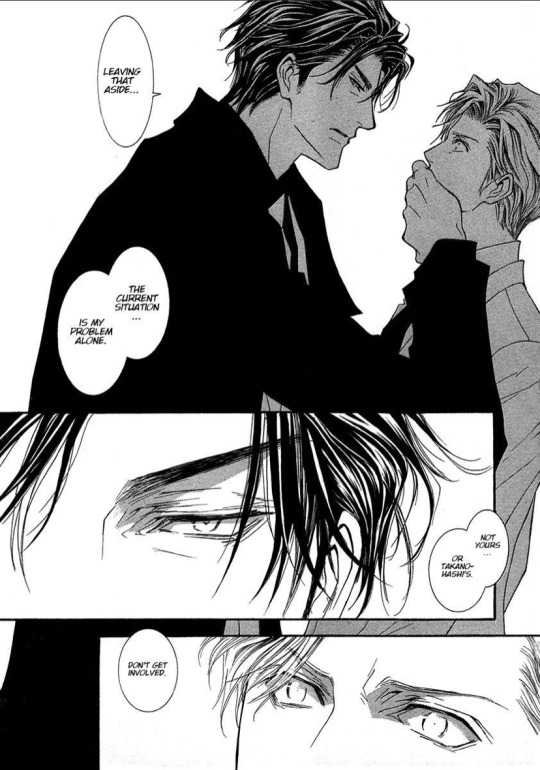

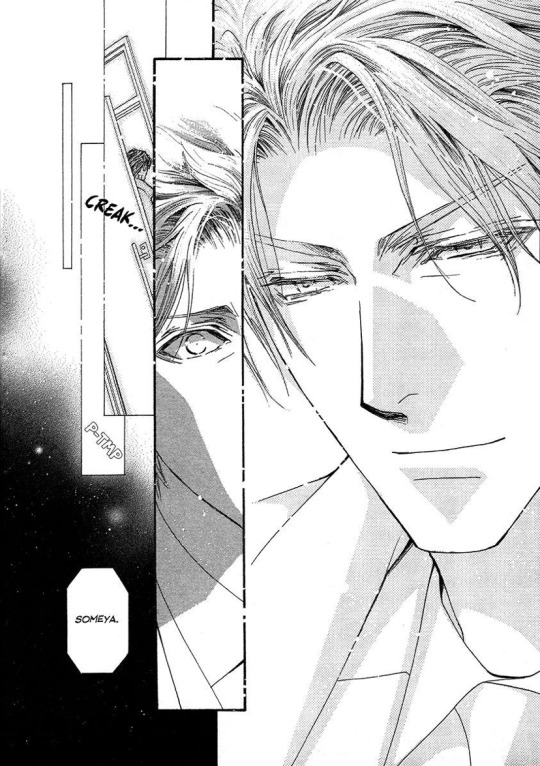



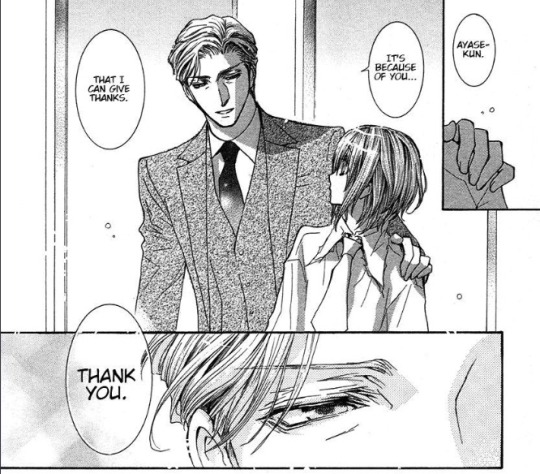
My heart...hurts.
Look at Someya's terrified face in the first picture. You'd think he saw a ghost, but no, it's just Someya surprised at Ayase's comment about Somoku looking like Kanou. Why was he surprised?
Kanou's last wish was for Somoku to be different than him. Kanou had expressed to Someya only that he wanted Somoku to be different and that means he didn't want Somoku to be alone.
I've mentioned that Kanou had a solitary mindset, especially before Someya got involved in Somoku's upbringing, but why did he think like that? He's a loan shark, first and foremost. It's not easy for him to trust because trusting the wrong person can be dangerous. And he has to be ruthless to ensure no one tries to get away with stealing his money. It's no wonder why Kanou came across as a lonely character in Vol. 6, Ch. 4, and the comic strip. He believes being alone helps him in the long run, even if it creates enemies like Konomi.
But Kanou raised Somoku to think like him, so what difference does it make that Kanou doesn't want Somoku to be like him?
I think the difference has something to do with regret. Kanou believed being alone protects him at his job, and he probably thought Somoku was going to take his place, so Kanou trained Somoku to think like him. But Kanou didn't take into account that Someya would change his perspective. Someya showed Kanou that sometimes he had to trust someone else and that trusting could lead to a bond so strong, so beautiful that even if they yelled at each other or pushed each other away, they'd be there for each other. And Kanou probably regrets that it took (maybe 6-12 years, I don't know how old Somoku is in the Vol. 10, Ch. 45.1 flashback) so long to trust Someya. He could've enjoyed Someya's companionship sooner had he not been so stuck in his solitary ways.
So even if Kanou wants Somoku to think like him because he thinks it'll keep Somoku alive, he wants Somoku to behave in the way Someya raised him. It's why, despite Kanou judging Somoku's brattiness, he comments, "...it's a good thing that that damned brat isn't anything like me." Because it's Someya's influence. Somoku's brattiness is Someya's fault. Somoku being short-tempered is Someya's fault. Kanou sees a difference in Somoku (because Kanou sure as hell wouldn't act like that at all), and he couldn't be happier. Why? Because Kanou doesn't want Somoku to be alone.
I think Someya gave Kanou the wrong idea that those personality traits are what will help Somoku make friends lol, but they are a sign that Somoku isn't emotionally stunted like Kanou. Somoku has the capacity to learn personality traits that will get him friends, and that's probably enough for Kanou.
And because Kanou had expressed his satisfaction only to Someya right before he died (LOOK AT THAT GENTLE SMILE HOLY SHIT), Someya took it upon himself to carry on Kanou's wish.
It's why Someya is so devasted in the sixth and seventh pictures when he saw Somoku's harsh expression mirror Kanou's expression. Someya feared Somoku would harden his heart and follow Kanou's footsteps. It's why Someya felt so much relief in the last pictures because he knew Ayase would change Somoku for the better and help carry out Kanou's wish when Someya no longer can.
SOMEYA IS SUCH A DEDICATED HUSBAND TO KANOU THAT HE WOULD THROW AWAY HIS HOMOPHOBIA IF ONLY TO GRANT KANOU'S WISH T-T
I'm sad that Kanou and Someya couldn't get a happy ending. I'm devastated that Kanou died alone after having known companionship. I'm upset that Someya has to live on as a widow burdened with the unabsolved guilt of having failed his husband. I'm disappointed that Somoku couldn't see that his father did care about him and that Somoku probably won't get a chance to think about that.
~*~
Well, that was my emotional journey as I read through the Kanou-Someya moments. I hope I got everything and explained everything even though nobody asked for this. I'm just glad I got to share my thoughts.
Here are some more pictures that I found cute but I didn't include:
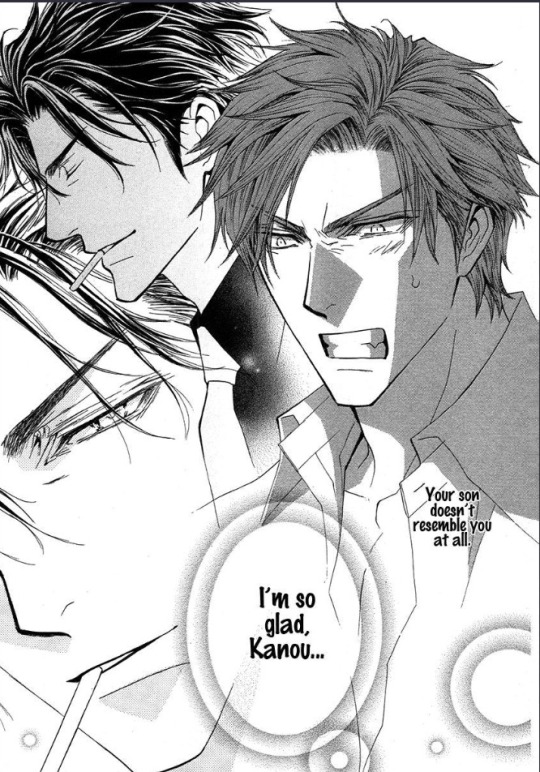
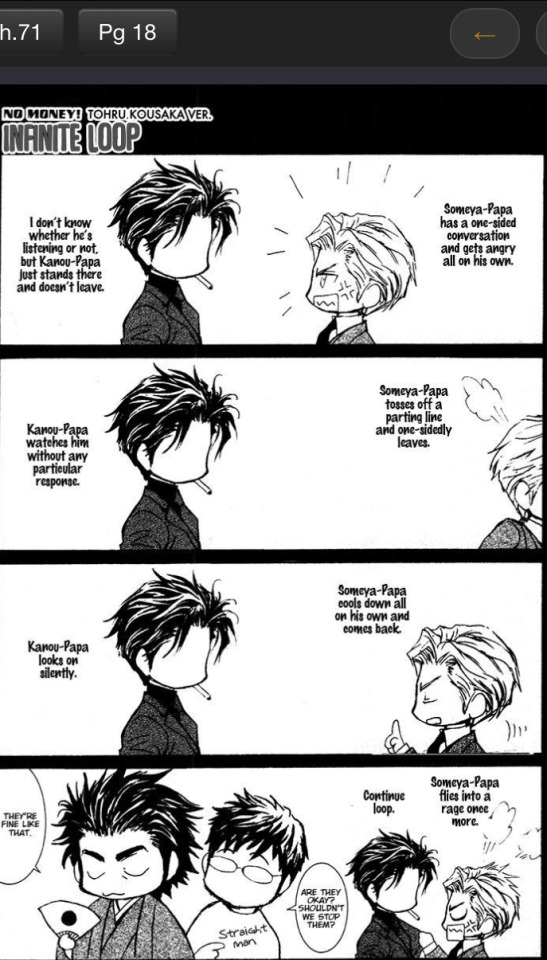


#okane ga nai#bl manga#yaoi#kanou#someya#long post#my thoughts#random thoughts#ramblings#kanou somoku#yukiya ayase
3 notes
·
View notes
Text
all evidence that points towards Magneto being Jewish before it was first explicitly established in 1991
!!None of this is my writing!! It’s a useful but outdated source that I merely revised to replace the G slur. It was written by Rivka Jacobs and the original can be found at http://www.alara.net/opeople/xbooks/magjew.html
The Magneto Is Jewish FAQ (revised 11/9/98)
Rivka Jacobs
(1) In Uncanny #113 (Classic X-Men #19), the added material has Magneto on Asteroid M, talking about the deaths of Magda, Anya, and he mentions Auschwitz for the first time. "I endured one death camp ... in Auschwitz ... I will not see another people fear what they do not understand and destroy what they fear." Uncanny #113 is from 1978. The additional scenes were included in 1988's Classic X-Men #19. So, we know Magnus was at Auschwitz, a death camp, not just a concentration camp. (Many fans [and writers] seem to get the two types of camps confused). There could have been a number of reasons he was at Auschwitz: he was a Polish political prisoner, a Russian prisoner of war, a member of the French underground, a homosexual from Germany, Roma, or, with a high probability, a Jew. (Out of 1.5 million victims of Auschwitz, between 1.1 and 1.2 million were Jews).
(2) In Uncanny #150 (one of my favorites) Magneto mentions, in a fight with Cyclops, "I know something of grief. Search throughout my homeland, you will find NONE who bear my name. Mine was a large family, and it was slaughtered ... without mercy, without remorse." So that eliminates German homosexual and French partisan, because the entire familes of such prisoners were not slaughtered throughout an entire "homeland." After Magneto thinks he has killed Kitty, he says: "I remember my own childhood ... the gas chambers at Auschwitz, the guards joking as they herded my family to their death. As our lives were nothing to them, so human lives became nothing to me." Storm is about to blast him for "killing" Kitty, and she says, "If you have a diety, butcher, pray to it!" Magneto answers, "As a boy, I believed. As a boy, I turned my back on god forever." So now we know that Magnus is not a political prisoner (German political prisoners were sent to camps on German soil, like Dachau, or Bergen-Belsen), he is not Polish, since whole Polish families were not herded to the gas chambers. The Poles were not the target of pre-meditated Nazi genocide. While the Russian people were the target of genocide, only Russian POWs were in Auschwitz, not whole families. So, we are now left with only two groups of people that Magnus could be from, the Roma and the Jews. Uncanny #150 is from Oct. 1981; already Magnus says something very interesting here. He says he "remembers" the gas chambers of Auschwitz, "remembers" his family being herded, he "remembers" the guards joking. Fact: no one remembers the gas chambers of Auschwitz except in two ways (or three if you believe the dead can speak to the living), either you were a Nazi SS guard or doctor or official, or you were a member of the Sonderkommando. The Sonderkommando, Jewish prisoners who were forced by the Nazis -- in all the death camps -- to do the dirty work of killing. It was Nazi official policy. The Jews, the lowest of the low to the Nazis, in Auschwitz hierarchy, followed by the Russians, and then the Roma, the Jews would be the ones to lead the victims to the gas chamber, to haul the bodies from the gas chambers to the ovens, to burn and bury the dead. The Jews would pull the teeth of the corpses, cut the hair, pile the bodies three at a time on the retorts of the ovens in just the right way. The Sonderkommando had a few kapos (overseers) who were German and Polish prisoners, criminals from civil prisons in Germany and Poland. During the summer of 1944, 19 Russian POWs from Mauthausen were sent to augment the Auschwitz Sonderkommando. Totally documented, on paper and by eye witness accounts. All other members of the Auschwitz Sonderkommando were Jews.
(3) In Uncanny #161, Sept. 1982, we have the story of Xavier's trip to Israel. There he meets Magnus for the first time. However, it should be noted that the entire story is a Charlie-dream, while he is with Lilandra. In Uncanny #161 we see for the first and last time Magnus' tattoo from Auschwitz. His number is #214782. Xavier says, "That tattoo, Magnus, were you ...?" Magnus answers, "Auschwitz. I grew up there." So now we know that Magneto was first in Auschwitz as a very young person, but we can't pinpoint the age yet. Also, his number is high for someone who was there from the beginning of the camp. The first Polish prisoners, like author Wieslaw Kielar, had very low numbers, like in the 200s. Sonderkommando survivor Filip Muller's number was in the 20,000s. He arrived in early 1942. Magnus' number is a standard number, however, without the A of the 1944 arrivals, or the Z of the Roma, or the other special classification symbols. Of course the penciller didn't know these details. So a standard Auschwitz number, which is too big, but it doesn't tell us anything.
4) Vision and the Scarlet Witch, Vol. 1, #4. Magneto has just found out Wanda and Pietro are his children. (This is from Feb. 1983). He is on the moon, in the Inhuman city of Attilan, telling VIsion about his youth. "I was born into a time and place ... Android ... where both man and mutant were persecuted for being ... different." Picture of the Auschwitz camp, guards tormenting emaciated prisoners, one of whom displays a very prominent and exaggerated Star of David on his clothing. Remember Jews and Roma were kept apart in the camp. In the next panel, however, Magneto sort-of goes into a fantasy. He says, "But unlike the other victims, I possessed the power to fight back." He imagines he's hurling Nazi tanks away with magnetic energy. What's this? In 1983, the reader doesn't know what to make of this. Keep in mind, he's meeting with Wanda, Pietro, Vision, and Crystal, and has held Luna for the first time. Is he exaggerating? Showing off for them?
(5) Now for the second most important comic proving Magneto is Jewish, Uncanny #199, Nov. 1985. Magneto with Lee Forrester and Kitty Pryde arrive at the National Holocaust Memorial in Washington, DC. (It's not really Lee, but Mystique, trying to capture Magneto). Magneto has been having an affair with Lee, he loves her. He brings her to the Holocaust Memorial? Why? Fun date, huh? Why, because he has no other family. These people are his family. Jewish survivors of the Holocaust. (The Roma have their own name for the genocide, and their own gatherings, with their own rituals and customs. Magneto has no reason to go to a Jewish gathering if he isn't Jewish). Lee/Mystique says: "Man's inhumanity to man ... how easily the race kills." Magneto answers: "Then, Lee, it was the Jews. My nightmare has ever been that tomorrow it will be Mutants." Why would he say that, why wouldn't he mention another ethnic group, if he weren't Jewish? Next, Magneto tells Kitty EXACTLY how to address the gathering in order to get information about dead or missing family members. How does Magneto know how to do this? Isn't it obvious that he's done this before? Why would he address a Jewish Holocaust gathering looking for information about his family if his family weren't Jewish? (And it is a Jewish gathering, besides the use of the word Holocaust, a speaker says in the background: "... the systematic institutionalized extermination of one people by another."). Kitty asks about her great-aunt Chava, who died at Auschwitz, and Magneto is recognized by two survivors, Ruth and David Shulman, two Jewish survivors. (Shul is another name for synagogue -- Shulman means man of the temple, or man of the synagogue). They remember Magneto as a youth in Auschwitz, and say he helped them survive. And witness him as having been there. (No implanted memories, please). They testify that he " ... Had been at that accursed place from the very start..."
Later, Mystique reveals herself, and arrests Magneto in front of all these people. Magneto says that he recognizes no authority. "My land ...all the countries of the world ... turned their back on me and mine when we were condemned to Hitler's death camps. Therefore, in return, I have sworn to deny them." So let's clear this up ... the Roma were not persecuted in Greece, the Greek Jewish community was decimated. A small number of Roma and Jews in Rumania were exiled to a new border country called "Transnistria" but the remainder of the Roma were left alone. Several hundred thousand of them. 350,000 Rumanian Jews were savagely murdered throughout the country. In Slovakia, the Roma were left alone, the Slovakian Jews were among the first sent to Auschwitz. After the Slovakian uprising was crushed in 1944, several hundred Roma who had courageously helped in the rebellion were murdered, along with the remainder of the Jews of Slovakia. Bulgaria did not persecute its Romani people. Bulgaria, although resisting deportations of its Jews, persecuted them locally. In the Netherlands, only the "wandering" Roma who were captured in camps and wagons were deported, about 500. The remaining who had bought homes or found shelter with neighbors, were left alone. The Netherlands is where Gabrielle Haller comes from -- in under two years 100,000 Dutch Jews were deported, most were killed. I could go on. There is no other people who were hunted everywhere the Nazis went or had influence but the Jews. There is no other people who had the gates of escape cut off after the war started, but the European Jews. Magneto's reasoning is based on this most extreme situation.
(6) Uncanny #211, Nov. 1986. The Mutant Massacre. Page 9 -- Betsy Braddock has just come in from discovering what happened to a wounded Morlock, who has just died. Magneto, Storm, and Wolverine are standing there in Xavier's infirmary. Betsy says, "... I saw a cadre of super-beings ... massacring every living thing in the Morlock tunnels." Magneto reacts immediately, out of pure emotion. "NO! The horrors of my childhood, born again...only this time, Mutants are the victims, instead of Jews." What else does this mean? He's talking about HIS childhood, he's making a parallel. If he weren't Jewish, he wouldn't have said Jews, he would have said Roma. The two groups of people are not interchangeable.
(7) New Mutants #49, March 1987. Magneto is dreaming. It is an entire page representation of the massacre of his family. Here we see for the first time, his family -- father, mother, sister -- as they were gunned down in front of open graves. The family members are dressed in middle class urban clothes. No peasant dress, no Roma clothing. (And it is not a cliche. Roma women always wore, at this time, their flowing skirts and distinctive scarves and clothing, similar to the Bosnian women of today). Being massacred with Magnus' family is a mixed group of people. Men in bowler hats and suits, one old woman in a long skirt. One man in a bowler hat has the side-locks of the devout Jew, but the other people could be anyone. Poles or Jews or Roma. It's Magnus and his family who are out of place. They are well-dressed, Magnus's sister in a proper school uniform with the prim collar. Every picture I've seen of the German Rom show: a people of color, having left India and Armenia five- to six-hundred years ago, the men wearing Fedoras (favorite style of hat) and normal suits and ties, and the women and girls always dressed in the long skirts and distinctive flowered scarves. The boys wear a mixture of urban short pants but scarf belts, some have socks, some don't. New Mutants #49, page 17, could show some Roma in the crowd, but Magnus' family members are definitely not Romani in this picture.
(8) X-Men Classics #12, back-up story, Aug. 1987. The actual scenes of Magneto's escape from Auschwitz. "And with World War II ending... the Third Reich defeated...it's guards wanted no witnesses left...to tell the tale of this horror..." Picture of an SS soldier about to shoot a fallen and stricken Madga. "He had been there from the start ..." Magnus has just slammed a wooden beam into the head of the SS soldier. "Grown to manhood within its electrified barbed wire fence. If he was to die, it would not be in this abattoir ... and not without a fight!" Magnus grabs a terrified Magda by the hand and drags her with him in his escape. (a) The war is almost over, it is winter, it is the winter of 1944-1945. The Roma were gone by 1945. All the Roma women were gone. Only 4 clerks, high-status friends of Nazi officials in Camp I, were left. The Romani camp was murdered in the gas chambers in August 1944. (b) This scene, by Claremont and Bolton, is completely accurate. It takes place on Jan. 20, 1945, two days after thecamp was evacuated and the Death marches began. Some 70 of the Sonderkommando were kept to help destroy the evidence of the death factory, before they were to be killed. Some 200 women from the woman's camp, Jews, were chosen to fill in the huge pits where bodies were burned. They had to haul ashes, break up human bones, all in the coldest part of winter. The SS soldiers sent back on Jan. 20th were sent to kill the women. That is exactly what you see in this comic book, because Claremont and Bolton took the time and cared enough, to do their research. Magneto was saving Magda becasue at that point, he wasn't the target, yet. If they were out by the burial pits to the northwest of the camp, that is a point close to the forest. It just makes sense.
(9) New Mutants #61, March 1988. On page 22, Magneto is alone, kneeling over the dead body of Doug Ramsey, thinking thoughts only the reader can see. This is one moment he would not misrepresent anything, to himself especially. He says, "An ill wind is coming ... they are registering mutants ... like they once registered my people in Poland ...! Who knows what horrors await us." Only the Jews were registered, and forced to wear armbands with the Star of David on them, in Poland (at the end of 1939). Efforts to murder the Polska Roma (the Polish Roma) began in 1942, but they weren't registered first. Young Magnus wouldn't have known about any of that in any case-- he was already at Auschwitz by 1942. He would only have known that "my people" the Jewish people in Poland, including the German Jews who had already been deported there in the first months of the War, were registered.
(10) Classic X-Men #19, March 1988, back-up story. Magneto is apparently working for the CIA hunting Nazis. He is about to be betrayed by them, and his lady love of that time, Isabelle, is about to be murdered. But as he is apprehending a Nazi war criminal he gets one of his massive headaches. "Pain," he thinks, "again indescribable." "Worse than the bite of the kapo's whip. The murder of parents and family, the death of a child ... the loss of a beloved wife!" So here we see that Magneto was the victim of kapos. He could not have been a kapo. He was too young anyway, as we've seen. He grew up in Auschwitz. Here he says the murder of parents, and family. The parents separate, gunned down. The remainder of his family, no doubt sent to the gas chambers later, while he was in the Sonderkommando. Remember what he said in UX #150, his entire family wiped out. So as a Jew in the Sonderkommando he not only watched his family die, he helped kill them. How can any other comic book character ever come close to Magneto for dramatic intensity, but only if he is a Jew.
(11) X-Factor Annual #4, 1989. Doom challenges Magneto to a duel of wills, with a helmet that pulls out unpleasant memories and torments the wearer. Who will crack first? Magneto takes his turn -- Doom describes what he sees, "...after the ignoble defeat of the Nazis in Germany, you and the woman Magda you rescued, fled the prison camp Auschwitz, in Poland."
"Auschwitz, where your family had perished --living skeletons -- and you had grown to manhood amid horrors most men could not conceive." First, Doom confirms that Magnus and Magda "fled" or escaped Auschwitz before liberation and after the Roma camp was murdered. Then he describes some of Magneto's family perishing, as living skeletons, at Auschwitz. They could either have been kept as prisoners, or brought in, starving, from ghettoes in Poland and gassed. They could have been either Roma or Jews. But then it's Doom's turn to wear the helmet. Doom's Romani heritage is discussed at great length. Doom is proud to be a Rom, he knows he is a Rom. Why would he not acknowledge that Magneto is also a Rom? Why did he say your family, implying your people, to Magneto? Not "our" people?
(12) And now the most important evidence, and just about my favorite X-Men comic, Uncanny #274, from March 1991. In the Savage Land, the entire comic is told from the point of view of Magneto. It is a first person narrative, he is talking directly to us, the readers. He is not exaggerating, he is not showing off. The writing is elegant and wonderful ... "My life's ambition has been to safeguard my fellow mutants," Magneto says. "Zaladane has no such compunction. And I hear the echo of Der Fuhrer's voice in the radio of memory, smell the awful stench of the sick and dying as the cattle cars brought the comdemned to Auschwitz. I wear red, the color of blood, in tribute to their lost lives. And the harder I try to cast it aside, to find a gentler path ... the more irresistibly I'm drawn back. I should have died myself with those I loved. Instead, I carted the bodies by the hundreds, by the thousands ... from the death house to the crematorium ... and the ashes to the burial ground. Asking now what I could not then ... why was I spared?!" So there it is. He describes his job at Auschwitz. That is it. This is no vague job description, this is what the Sonderkommando did. This is fundamental to the history of the Holocaust, to the history of Nazi Germany. Making the Jews the ones who had to do all the dirty work in the death camps.
Marvel cannot say they have their own version of Holocaust history. What kind of reasoning is that? Where do the editors and writers of Marvel get off making up their own history of the Holocaust? Where do they draw the line? Has any reader out there ever seen any major publisher or entertainment outfit, outside Neo-Nazi groups and the Militias or Far Right Splinter groups, who just took it upon themselves to change a Jew into a Romany and change Holocaust and Auschwitz history to make it fit? Magneto says it here, he was a member of the Sonderkommando. He was not a kapo. He was not a Russian POW. He was a Jew! On page 14 of UXM #274, Magneto is dreaming again. He again sees his family being gunned down. He again feels what it was like to be buried alive. Rogue wakes him up.
(13) Uncanny X-Men #275, April 1991, which concludes the Savage Land story from UXM #274, referred to above, also contains confirmation as to what happened to young Magnus. Magneto says, directly to the reader, in diary-like narration, as he uses the last strength of his emaciated body to push away his captors, "They think me beaten, finished. A mistake many have made in the past. As I found the strength, as a boy, to survive being machine-gunned and buried alive, and later the unimaginable horror of Auschwitz ... so do I find it in me, here and now, to break free."
(14) X-Men Vol. 2, No. 2, Nov. 1991. The beginning of the end for Magneto. But on page 24 he says to Moira MacTaggart, who has seemingly betrayed him, and enraged him, "Of course not. You worked for the betterment of the world and the race. I heard those same rationales as a boy, in the Auschwitz Death Camp. From Dr. Joseph Mengele himself!" Mengele's first victims were the Roma, he liked the Roma. He brought the children candy and extra food. And in August of 1944, after trying unsuccessfully to save the Romani Family Camp (also for his own experimental purposes) Mengele obeyed his orders and vigorously hunted down and helped exterminate all remaining Roma. He then dissected those of most interest to him, and sent body parts to Berlin. Then he turned his attention to the Jews of Auschwitz. Only his Jewish victims have survived. His Romani victims, those transfered out of the camp in the spring and summer of 1944, have rarely come forward. If Magneto is alive in Auschwitz after the start of 1945, and he personally heard Dr. Mengele, he is a Jew.
Magneto is a Jew especially since Mengele would have been one of his supervisors in the Sonderkommando.
(15) X-Men, Vol. 2, No. 3, Dec. 1991 -- Magneto to Xavier, "You speak to the best in humanity. I have endured the worst. You imagine the reality of the Holocaust, of the Nazi Death Camps. I grew up in one." Magneto says The Holocaust. This is the translation of SHOAH, and was first used after the war, and popularized by Eli Wiesel. It means the Jewish Holocaust. One can say the Romani genocide, and today sometimes you'll hear the Romani holocaust, or the Russian holocaust, or the holocaust perpetrated against the mentally ill and the handicapped. (Nazi pre-meditated genocide was really only carried to the fullest extreme against three groups, the first were the mentally ill and the handicapped, who were the first victims of genocide. The second and third groups were the Jews and the Roma). But the Holocaust is what Jewish people say when they refer to the calculated campaign of Nazi Germany to kill every Jew in the world. (They actually made lists of every country in the Western world, and all the Jewish populations. They made no such list for any other people). Nazi Germany succeeded in killing almost 6 million of their foremost victims, until the Third Reich was defeated.
(16) X-Factor #92, July, 1993. Havok and X-Factor are battling Cortez and the Acolytes, in this opening chapter of Fatal Attractions. Cortez is ranting about the "flatscans" and how mutants have to subjugate them. Havok says, "Out to destroy the "inferior" race ... in Magneto's name? Don't you know what an insult that is to the memory of the very man you claim to worship? Fifty years ago, Magnus barely survived a Holocaust that destroyed almost all of his people: all because some lunatic took it upon himself to decide who deserved to live ... and who didn't. Where's the sense in resurrecting that kind of evil ... in the name of one of its victims?!" Cortez answers, "You've seen this place Havok! You've seen the sentinels! You tell me ... where's the sense in letting the flatscans do to the mutants what Hitler did to the Jews? ..." Cortez has done research on Magneto, he says the Jews, as a parallel metaphor. Why say that, if Magneto isn't Jewish?
(17) Then comes the infamous Unlimited #2. This is a long and involved FAQ I've got going here, so I won't go into detail at the moment. But the bottom line is, everything that Gabrielle Haller says about Magneto's history is false. I don't want to go line by line over it now. Everything! Danzig was not annexed. It was a Free City, under League of Nations protection, that voted itself a Nazi government and welcomed the Nazi troops in like liberators. Gauleiter Forster, the extremely anti-Semitic Nazi leader of Danzig ordered all 10,000 Jews of Danzig to be kicked out of the city in 1939, not the Roma. The Jews. Auschwitz wasn't opened as a Polish political prisoner camp until the summer of 1940, not 1939. The Roma were sent to German municipal camps, in Germany and the Greater Reich, as early as 1933. But they were not sent to Auschwitz from Germany until 1943. The only people who were in a work camp in Auschwitz before it opened were 300 Jews from the town of Auschwitz who were forced to transform a collection of horse stables and army barracks into the Polish prisoner camp. "Genocide, extermination ..." of Poles? No. The Polish people suffered terribly, and were considered "sub-human" by the Nazis. Millions of Polish citizens were killed throughout the course of the war, as soldiers, as slave laborers, as underground fighters, as members of the intelligentsia. But this was Nazi suppression of a conquered country, not planned genocide. Roma, Yes. The homosexuals, no. Not genocide. Persecution and imprisonment. Treated terribly. But people weren't sent to the gas chambers just because they were homosexuals. And "intellectuals" ? (How could Nicieza have written this?) Intellectuals were targets of genocide? Well, I hardly think so, since Goebbels, and Albert Speer, and even Mengele were considered intellectuals.
No one was sent to the gas chambers, or was shot in an open grave, or was tortured and murdered JUST because they happened to be an intellectual. Thousands of Polish citizens who were members of the intelligentsia (the educated class, the vanguard or elite of the educated class), were murdered in the first months of the war. But there was no planned campaign to hunt down every intellectual in Europe and exterminate them. The mentally ill and handicapped, the Jews, and the Roma were the primary targets of Nazi genocide. The Russians came next. Everything Haller says about Magneto in Unlimited #2 contradicts most of Magneto's history as presented in 15 years worth of comics.
(18) Until recently, when, in Road to Onslaught, Marvel once again published that outrageous Gabrielle Haller speech about Magneto like they were proud of it (??) the next references in the Age of Apocalypse comics portrayed Magneto once again as Jewish. In X-Men Vol. 2, No. 40, where David Haller, Legion, pulls Magneto's memories out, you see young Magnus with the men, standing behind and below a high, barred window. This is an accurate portrayal of the quarters of the Sonderkommando at Auschwitz I. At Auschwitz I, only the Sonderkommando (other than prisoners awaiting execution) were kept in isolated basement cells, the windows of which were high, barred, and as seen from the outside, half-below ground level.
And why is Magneto in Israel anyway? How could he have come there? Well, why would a Romany go to Israel when at least 30,000 Roma lived in Germany in the late 1960s and early 1970s? And many more Rom formed a thriving community in Paris. Why not just go home to his own clan and tribe? Roma have a complex system of extended familes, clans, and tribes. Why go to Israel to "find himself" or find his "soul"? A German Jew had no place to go but somewhere else. A Polish Jew definitely had no place to go back to, since some Polish fanatics continued to murder returning Holocaust survivors well into the late 1940s. Any Jew can emigrate to Israel, under the Law of Return. All Magneto had to do was show them the tattoo on his arm. And he was home. (And in case some of you were wondering, as some of us have discussed, with the exception of the Muslim Bosnians, only the Jews of Europe practiced circumcision. It was a religious rite, not a medical procedure. Only Jewish men and boys were circumcised among the prisoners at Auschwitz. The Nazis already knew what Magneto was. He was chosen for the Sonderkommando, he was Jewish. He was not pretending to be a Jew. He wasn't misidentified as a Jew. He was a circumcised, young Jewish man). Furthermore, Magnus at this time had forged papers, that identified him as "Erik Magnus Lehnsherr." He could have immigrated to any country in the world, including the United States! If he were Roma, and didn't want to self-identify as such, why not go to America? Why go to the one country that represents enormous pain for modern Roma -- i.e., the Rom today deeply resent the focus on Israel, and the support Israel enjoys among nations of the Western world, while the Roma continue to be persecuted and ignored.
(19) In Astonishing X-Men #3, formerly Uncanny, from May 1995, we have the most clear reference to Magneto's being Jewish, written by Scott Lobdell. Magneto has just hit Bishop, and is helping him to his feet. He says, "Long before Xavier died ... before this point of divergence ... I stood by helplessly as millions of my people were led to slaughter in the name of 'genetic purity." Now the AOA is not a what-if story. It is a divergent timeline. Magneto says, before the timeline diverged. What other people were lead by the millions, led to the slaughter, in the name of genetic purity? Many people suffered and died in World War II. 250,000 to 500,000 Roma were murdered. Millions of Russians and Poles during the course of the invasions, and in political violence, and in acts of pure murder, were exterminated. But only the European Jews were "led to the slaughter" in the millions because of one man's racial beliefs. Only the Jews of Europe Persecutionand incarceration are not the same as genocide and extermination.
20) X-Men #72, cover date February 1998, published in mid-December 1997. This comic book makes a significant contribution to Magneto's history. Basically, the book reveals that the name *Erik Lehnsherr* which was revealed by Gabrielle Haller in Unlimited #2 to be Magneto's real name, is fake, and so Haller's assertion that Magneto is a *Sinte* Rom was based on false and forged identity papers.
The scenario begins with Gabrielle Haller, lying on her bed, working on a lap- top computer, writing the American Sen. Kelly, begging him to help find and secure the release of Charles Xavier. Sabra, the Israeli super-hero, a mutant and Mossad agent, suddenly appears floating in the air outside Haller's balcony doors. Haller has just pushed open the doors, saying, "You're too important to lose, Charles. I will see you ... FREE?" And Sabra says, "Sometimes, Ambassador Haller ... freedom, like the truth, is little more than an illusion. Don't you think?"
Sabra has come to Haller with information. She says to Gabrielle Haller: "I"m sure you recall shocking the world when you announced that you had UNDENIABLE proof ofMagneto's identity as Erik Lehnsherr. The undeniable has just been DENIED." Sabra then goes on to show Haller, and the readers, the file on a master forger named George Odekirk. In this file, apparently, is a computer analysis of the identity papers of Erik Lehnsherr, which shows that Odekirk forged those documents. Haller says, "He created Erik Lehnsherr? If this is true ... you must take me to him! He could be our only link to Magneto's true identity ... our last chance to stop him once and for all!"
But just as Sabra is flying Haller to the Transylvanian Alps, to meet with Odekirk, the scene switches to Odekirk, who is working on another forged passport, sitting in bed while his wife sleeps beside him. Suddenly, Odekirk looks up -- he has a visitor. It's Magneto, in full costume.
Magneto is floating in the air. He surrounds Odekirk's bed with his magnetic energy, and uses his power to keep Odekirk's wife unconscious. He says, "You failed me." Odekirk responds, "Please ... please, my wife ..." Magneto answers, "She will sleep the sleep of the innocent. She has done nothing ... but you ... YOU, my friend, have BETRAYED me." Odekirk protests his innocence, and then Magneto makes this remarkable speech: "Do you remember what you promised me the night I came to you, torn and filthy, nearly a quarter century ago? I was searching for my beloved MAGDA, determined not to lose her as I had lost so many others in the fire that engulfed all of Europe during my childhood. The authorities were in pursuit of me for the "crime" of avenging my daughter's murder. I was willing to deny who I was ... everything that my family died for ... so that I could find one woman ... so that I would not be caged AGAIN. The Erik Lehnsherr fabrication was a convenient means of ensuring that. You swore that the forged papers were FLAWLESS, that your skills were unsurpassed... but now, you have proven to be a liability. Your work has been called into queston by my enemies, and they will trace Erik Lehnsherr the Sinte BACK to you." Odekirk protests, "That is impossible! That forgery was impeccable! My work is ... " Magneto answers: "It was not ENOUGH! You gave birth to Erik Lehnsherr, Odekirk. And tonight, you have killed him. My secrets shall die with him. All that remains now ... is MAGNUS."
This scene says, subtly but clearly, that Magnus denied who he was, gave up everything his famly died for, to take the false identity of a Sinte Rom named Erik Lehnsherr. Since this entire FAQ has gone into great detail showing exactly how and why Magnus was born Jewish, it seems there is no doubt now, that Magneto's family and he himself, were Jews. Magnus would not say he denied *everything* his family died for, by taking a Romani identity, if his family were indeed Roma. As I pointed out above, only the Jews and Roms were targeted as entire peoples, and killed for no reason other than they were Jews and Roms. Magnus was either one, or the other. Since in XM #72, it is revealed that he is NOT a Rom, we must conclude he was born a Jew.
There are several continuity problems that arise from the revelations of XM #72. Several unanswered questions:
1) How much of Haller's speech (Unlimited #2) was based information contained in Odekirk's forgery, how much was based on what she personally knew, and how much did she "fabricate" herself? She makes a large number of mistakes, about nearly every aspect of Magneto's history and life. She also gets her Holocaust history and dates wrong. Did she perhaps add her own *facts* to what she found in those old identity papers? Was she perhaps trying to make the story coherent? As in, trying to make what she knew about Magnus and his history fit what she learned about *Erik Lehnsherr*? For example, where she says, on page 19 of Unlimited #2, "...Lehnsherr had taken to calling himself MAGNUS ... as if by choosing his MIDDLE name, he could bring some semblance of BALANCE and SIMPLICITY to his haunted life." This is Haller's supposition -- the reason he was calling himself MAGNUS in Israel. She knew him as Magnus back then, she had just found out, his full name was supposedly *Erik Lehnsherr.* Did she try to splice together the information?
2) While XM #72 makes it clear why Magnus cloaked himself in this false identity and ethnic background initially, what is not so understandable is why he continued to maintain that false identity after his search for Magda was over, and he immigrated to Israel. Did he use the forged *Erik Lehnsherr* passport to enter Israel? Why would he use a false identity and ethnic background to enter Israel, when he was a Jew?
3) Why would Magnus continue to use the Erik Lehnsherr identity during the Age of Apocalypse, especially since he publicly identified with being a Jew? (Astonishing X-Men #3, quoted above.)
4) Magnus worked for at least one intelligence agency, most likely the CIA (Classic X-Men #19). He then hunted dangerous mutants, for his own mysterious purposes, as shown in a brief cameo in Generation X #10 -- which was a memory belonging to Sean Cassidy, telepathically accessed by Emma Frost. During the time he was working for the CIA, his code-name was Magneto. In Classic X-Men #19, he is called only Magneto. In Generaton X #10, Interpol agent Sean Cassidy doesn't know who the man is who is helping him track down Arcady (the future Omega Red). Emma Frost, commenting from the present as a psionic guide to Cassidy's memories, calls the man *Erik Lehnsherr.* But the question is, after he left Israel, did Magnus use the false identity Erik Lehnsherr?
5) During the time that Magneto tried to follow Xavier's path, roughly from UXM #196 through UXM #253, and New Mutants issues #35 through #75, including UXM #188, NM #21, #23, #24, #26, #28, and #29, he referred to himself as Magnus, and others like Storm and Kitty Pryde called him Magnus. Even though he was disguised as Michael Xavier for the outside world, the X-Men and their associates all knew Magneto as Magnus. During this time, Magnus also identified strongly with his Jewish and Jewish Holocaust history. The question now is, what happened to the *Erik Lehnsherr the SInte* identity during this time?
6) Why, now, after so many years, did Magneto find it necessary to kill George Odekirk in order to protect his identity? We know why he took the false name and ethnic background to begin with. But we have no evidence that he continued to use *Erik Lehnhserr*, during each stage of his pre-Magneto career. After he became Magneto, after all the battles with the X-Men, after the events of Fatal Attractions, after the mind-wipe and the appearance of Joseph, after Onslaught, why would Magnus be so concerned with protecting his true identity? Was he trying to protect the memory of his family? Has he maintained contact with pre-Holocaust family grave sites, or places where he once lived? Is he worried that the very bones of his ancestors might be violated by those looking for his genetic material? Then there's Anya, his beloved daughter -- she was never Anya *Lehnsherr*. Her last name is now unknown -- is Magneto trying to protect something concerning her? George Odekirk wouldn't be the only witness to Magneto's true identity, either. What about those Carpathian villagers, who accepted Auschwitz escapees Magnus and Magda in 1945? Did anyone in Vinnitsa who knew Magnus' true last name survive his burst of electromagnetic radiation? What about Ruth and David Shulman, who knew him at Auschwitz, and recognized him, in UXM #199?
These, and other unanswered questions, remain.
By removing the *Erik Lehnsherr the Sinte* identity, fixing that particular retcon from Unlimited #2, and leaving the rest of Magneto's history intact, writer Joe Kelly and editor Bob Harras have not officially stated that Magneto was born Jewish, and was a Jewish survivor of Auschwitz. But, as was the case during the years Chris Claremont wrote the character, the references to Magneto's Jewish identity are there, subtle and at the same time, obvious.
7 notes
·
View notes